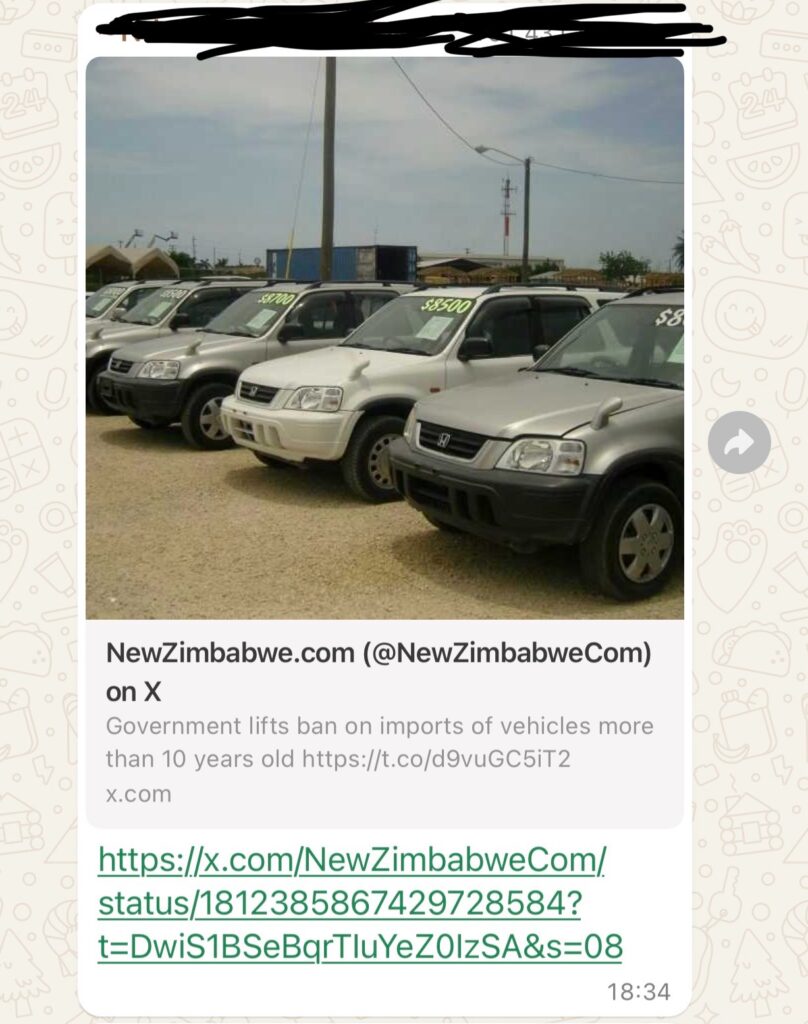+10 years Car Import Ban still on – with exemptions
CLAIM: Government lifts ban on imports of vehicles more than 10 years old
SOURCE: NewZimbabwe.com
VERDICT: Misleading
What’s in a headline? Everything, apparently. People often skim headlines and share them on social media without reading the full article. A misleading headline can spread misinformation faster than the truth.
On 14 July, 2024, online newspaper, NewZimbabwe.com posted a link on X (formerly Twitter) to a story headlined ‘Government Lifts Ban on Imports of Vehicles More Than 10 Years Old’.
The post quickly got traction with 144,000 views in less than 24 hours.
Although most of the comments were from people pointing out that this was misleading, there were some who believed that the ban had been lifted; here ‘a very welcome move. was so disappointed to be told I could not purchase a toyota hilux 2.4 D because it was more than 10 years old. How I love the car. very refreshing news’ and here, ‘The Zim Gvt is broke .. they now want to make a killing thru duty & excise on these old bangers’.
Car imports of vehicles over 10 years old were banned earlier in 2024 replacing a partial ban from 2021.
Statutory Instrument 54 of 2024 cited as Control of Goods (Import and Export) (Commerce) (Amendment) Regulations, 2024 (No. 10) gazetted in March, deleted the 2021 requirement for an import licence for older cars, replacing it with a pure ban plus a re-export requirement.
‘Second-hand vehicles aged 10 years and above from the date of manufacture shall not be imported. Any second-hand vehicle prohibited under this subsection shall be re-exported by the owner of the said vehicle at his or her expense,” read the SI.
Fortunately, the Ministry of Transport responded to the NewZimbabwe.com; ‘Good day, kindly correct this, the headline is misleading. S.I 111 of 2024 stipulates that this exemption only applies to used motor vehicles imported by diplomats and returning residents granted Immigration rebates by the Zimbabwe Revenue Authority (ZIMRA) in accordance with the Customs and Excise Act [Chapter 23:02], Customs and Excise Regulations and any other relevant legislation. These residents must meet all eligibility requirements for the Immigrant Rebate programme’.
New Zimbabwe.com then corrected the headline and story introduction to be more factual on the website, ‘Govt partially lifts ban on imports of vehicles more than 10 years old; returning residents, diplomats to use facility’ and the introduction was modified to read, ‘THE Government of Zimbabwe has partially lifted the ban on importation of cars older than 10 years, and now allows certain classes of people to do so’.
A lie can travel halfway around the world while the truth is still putting on its shoes
Unfortunately, while NewZimbabwe.com corrected the headline and modified the introduction to the story to be more factual, the horses had already bolted, as it were.

Not only had the headline, misleading as it was, found its way to other social media platforms like WhatsApp, it had also been picked by other publications.
AllAfrica.com, at the time of this fact check, was still carrying the uncorrected version with the misleading headline and introduction.
Be wary of headlines
While headlines, need to be catchy to grab attention, they need to be factual. A misleading headline might not be as dangerous as a completely fabricated story, but it can still have a negative impact on how people understand the world around them.
- Misinformation Spreads Quickly: People often skim headlines and share them on social media without reading the full article. A misleading headline can spread misinformation faster than the truth.
- Creates False Impressions: Even if someone reads the article, the first impression they get comes from the headline. A misleading headline can colour their understanding of the story, even if it’s corrected later.
- Erodes Trust in Media: When people see headlines that do not match the articles, they lose trust in the media as a whole. This can make it harder for people to find reliable information.
Here are some of the ways headlines can be misleading:
- Taking things out of context: A headline might focus on one small detail of a story, making it seem more dramatic or important than it really is.
- Using emotionally charged language: Headlines that use scare tactics or strong opinions can make people react without thinking critically.
- Omitting key information: A headline might leave out important details that change the meaning of the story.
Conclusion
The claim that ‘Government lifts ban on imports of vehicles more than 10 years old’ has been rated as misleading. The Statutory Instrument concerned only provides exemptions where only certain classes of people are now allowed to import cars more than 10 years old, rather than a lifting of the ban or even a partial lifting. While the original story has been corrected, other misleading versions still exist highlighting the dangers of creating false impressions, even when headlines are later corrected.








